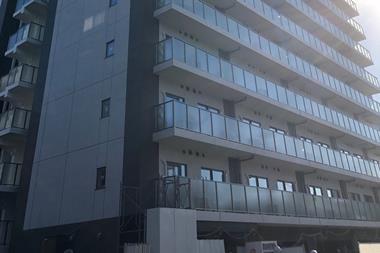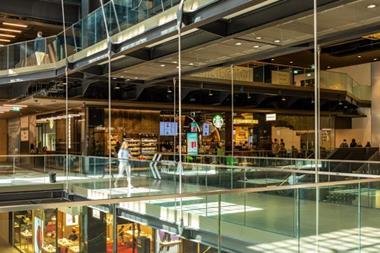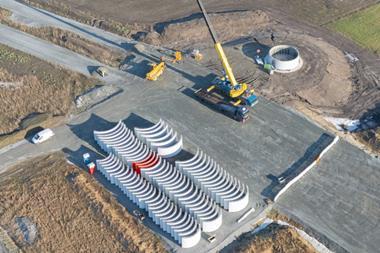Beijing's location and capital city status have stood it in good stead in the past but in order to remain competitive it will have to build on its other key asset - infrastructure. John Su reports
The quadrennial dream meet for top athletes all over the world is only weeks away from becoming a reality, with the opening of the 29th Olympic Games in Beijing on 8 August. Apart from the euphoria in the run-up to the Games, where many businesses from all over the world have been busy preparing themselves to capture the opportunity to boost sales, or to gain a foothold in this huge emerging economy, concerns have also been raised over the potential economic downturn afterwards.
It has been reported that Bank of China recently conducted a study looking at 12 sessions of the Games spanning a 60-year period, and found that the host country's annual GDP growth in nine of these sessions was 0.4-2.5 percentage points lower in the eight years after the Olympics than in the eight years prior to the event, showing that an economic slowdown after the Games is fairly common.
The so called post-Olympic downturn is mainly caused by a dramatic increase in investment, consumption and logistics movements in the run-up to the Games. Typically, these activities shrink sharply after the event. If the past was a perfect indicator of the future, the city of Beijing would be the worst-affected Chinese city after the summer. Luckily, many economists believe that China will be able to buck the trend on the back of a growing service industry and a maturing middle class.
As for the Beijing real estate market, we believe that it will continue solidly because of the city's geographical location, status and large affluent consumer base. The legacy of the Games is actually going to be beneficial to the Beijing commercial real estate market.
China is a huge market undergoing rapid development and the transformation of Beijing in recent years has been remarkable. The Olympic Games has merely accelerated the progress of Beijing to becoming a more advanced Asian city. The construction of facilities, improvements to the city's infrastructure and the regeneration of some older neighbourhoods have been obvious throughout the city.
According to figures from Jones Lang LaSalle, high-end stock for office, retail and logistics markets in Beijing is expanding by a combined total of 3.9m m2 in these two years. The risk of oversupply is apparent, and the obvious question from a property investor's perspective is whether the new space will be absorbed reasonably quickly.
In the office and retail sectors, vacancy rates are already on the rise, and are expected to reach around 20% by the end of this year. Normally, this would translate into significant rental declines, but the market has so far been resilient to any downward pressure, even for the older existing grade A facilities. Beijing, being the capital and the political centre of China, as well as the most important consumer market in north China, has always been seen as a strategic location for many local and foreign companies.
The third-largest city in China has a population size of just below 16m and the highest per-capita disposable income among all cities in North China. Prior to 2007, Beijing suffered from a shortage of high-quality space and this has created a significant level of unfulfilled demand over the years. The newly completed developments have so far been had an enthusiastic welcome from end users, and the higher rentals achieved in these better quality facilities are also strengthening the general market sentiment, amid rising vacancy. It is clear that the increase in absorption level observed in recent years has more to do with local market dynamics than the pre-Olympics hype.
Nonetheless, the long-term benefit from improved infrastructure because of the Games is not to be overlooked, as it will certainly make the city more accessible and less costly to get around; a critical factor in any business's location selection decision. This will certainly also help prepared the city for population growth, projected to reach over 20m by 2020, with a per-capita disposable income that will be four and half times today's level.
The story is slightly different for the logistics market. Although much of the demand over the past few years has been coming from the run-up to the Olympic Games, the rapid growth in China's exports, together with the massive inflow of Third Party Logistics Providers (3PLs) following the WTO deregulation and the rising domestic consumption, are all important factors that will continue to drive the industry well after the Games is over at the end of August. There may be a decline in warehouse space requirements immediately after the event, but the long-term outlook on the city's logistics industry remains positive, as Beijing integrates more into the Bohai region.
Within the government's 11th five-year plan (2006-2010), Beijing has earmarked a total of RMB60bn (€5.5bn) to improve the city's transportation infrastructure. Expressways and a high-speed railway line are being built to enhance the connectivity with Tianjin, a port city located 120km southeast of Beijing. This will reinforce Beijing's position as a distribution hub for imports in the modern multi-mode logistics system, especially given its status as the second largest retail market of China, and the impact of the economy on other cities nearby.
Also, Beijing international airport, China's second largest airport, is projected to experience 80% growth in cargo throughput in the five year period to 2010, strengthening further the city's position as the most important air logistics hub within the Bohai region.
There is little doubt that Beijing will see less commercial activity immediately after the Olympic Games, and a higher supply of commercial space, resulting in a minor correction to both prices and rentals for properties in the short term.
However, the large-scale infrastructure projects designed and constructed to support the Games will make the city more business friendly, attracting international corporations to locate there as a result. While major events like the Olympics come and go, the city's status and its geographical location will not change. The future long-term success of Beijing will depend very much on how effectively it can strengthen its position as the leading commercial centre within north China, taking advantages from the accelerated progress on the city's infrastructure in recent years.
John Su is director of Asian research and investment strategy at Aberdeen Property Investors












